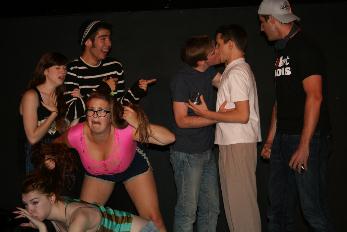
The Ottawa cast of Dog Sees God: Confessions of a Teenage Blockhead.
Charlie Brown and the Peanuts gang have leapt from page to stage more than once. The cast of preteens and their loyal dog feature in You’re a Good Man, Charlie Brown; Snoopy: The Musical; and even the questionably conceived Snoopy on Ice. Previous adaptations of the famous comic all received approval from series creator Charles M Schulz. But that’s not the only thing setting Bert V Royal’s Dog Sees God: Confessions of a Teenage Blockhead apart.
The 2004 “unauthorized parody” (promotional materials loudly proclaim First Amendment rights) reimagines the troupe of innocent youngsters as angst-ridden teens, struggling with drugs, eating disorders and sexuality. While Schulz’s work often had a distinctly Christian sensibility, Royal’s main character (not so covertly named CB) questions the existence of god.
Director Laura Young proposed the script to Ottawa’s Red Collective after appearing in their 2011 production of The Laramie Project.
“He writes about teenagers without turning them into after-school special stereotypes,” the St Clair College graduate says. “Some people see it as a bit far-fetched to be considered parody. But it does a great job extending the philosophical elements of Peanuts into the context of a realistic teenage experience.”
Whether or not the characters play as realistic, they’re a far cry from the series originals. Blanket-clutching Linus now puffs a joint to quell anxiety. Pig Pen is a squeaky-clean but violent jock asshole. Lucy pops lithium to treat her pyromania. CB’s journey toward atheism after his dog’s untimely death diverts into sexual confusion when he shares a kiss with piano prodigy Schroeder.
“His grief leaves him questioning his spiritual path, but he suddenly finds himself on a journey of sexual discovery as well,” Young says. “He doesn’t understand where these feelings are coming from but realizes he needs to figure out what they mean.”
Young knows firsthand the experience of questioning one’s sexuality. Coming out as a lesbian in the ninth grade, she struggled to find support while attending a Catholic school. Though she was lucky to have a group of understanding friends and parents who accepted her wholeheartedly, when it came to a formal support system within the institution, her pleas fell on deaf ears.
“I’d read about GSAs online and wanted to start one,” she says. “When I went to the school chaplain he didn’t condemn my sexuality, but he said a club like that could not be permitted.
“If I have one regret it’s that I didn’t keep trying,” she adds. “If you’re thinking about starting one, I say just keep asking people. Sooner or later someone will say yes. GSAs aren’t just about providing a safe environment for queer students. They’re also a space for straight students to ask questions, which is hugely important. High school is an awkward time, and no one wants to be the one who asks a stupid question in class and has everyone laugh at them. Information facilitates an open, accepting environment, and GSAs are often the only way it gets distributed.”
Dog Sees God: Confessions of a Teenage Blockhead
Thurs, Sept 27-Sun, Sept 30, 7:30pm
Club SAW, Saw Gallerie
67 Nicholas St
Tickets can be purchased by emailing red.collective@hotmail.com


 Why you can trust Xtra
Why you can trust Xtra


